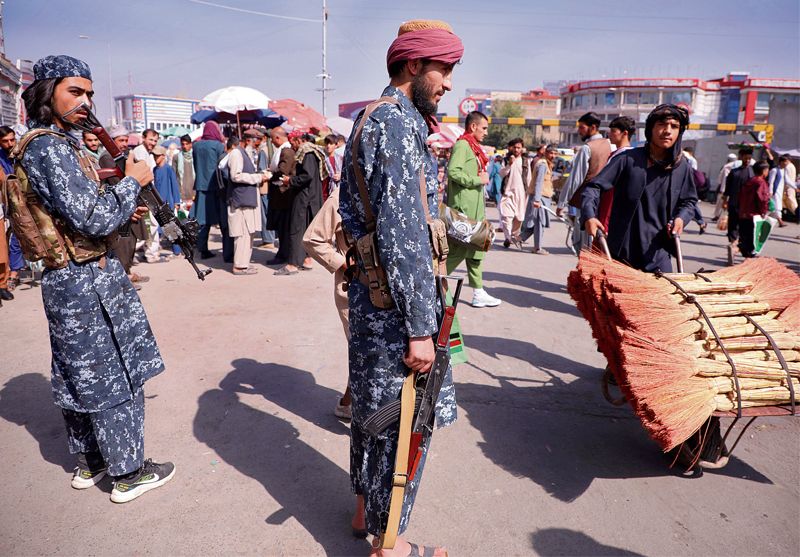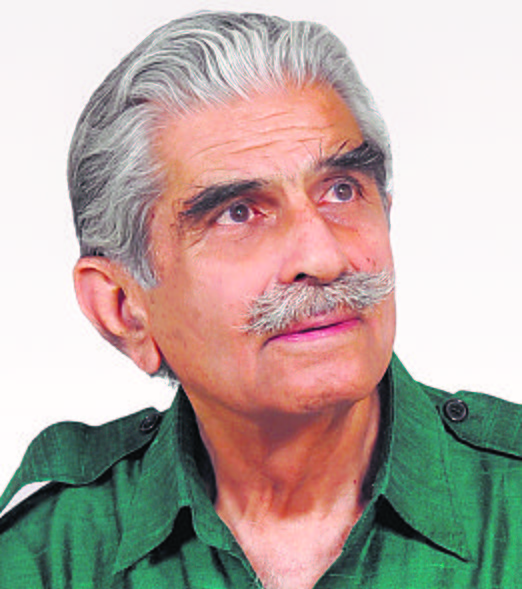Anas Haqqani, youngest son of the founder of the anti-India Haqqani network, Jalaludin Haqqani, stated that Kashmir was beyond its jurisdiction. But the Taliban spokesperson, Suhail Shaheen, said they have the right to raise their voice for Muslims in Kashmir. Will Pakistan allow good relations to materialise between India and the Taliban as such a development would increase the Taliban’s strategic autonomy?

NEW THREAT: The danger of surplus Taliban cadre trying to infiltrate into J&K will be a challenge for security forces. Reuters

AN old story about hordes of surplus Taliban invading J&K which periodically repeats itself is moving full circle. This time though, the government has issued an alert, warning all states and Central armed paramilitary forces that armed terrorists from Afghanistan could attempt to aggressively infiltrate into India, especially J&K. Threats to Kashmir oscillate, either due to adverse developments in Afghanistan or a steep dip in India-Pakistan relations. In 1996, when the Islamic Emirate of Afghanistan was first established, fears of such a contingency were re-kindled when insurgency in J&K was on the boil. But the Army commanders were confident of combating fresh incursions. The terrorist population then had peaked at 3,500, compared to less than 200 insurgents active today. India has nearly 75 years’ experience in battling cross-border terrorism in J&K, making it the longest active insurgency of our times.
Fast forward to August 15, 2021: No one honestly forecast the catastrophic collapse of the Afghan National Security Forces (ANSF) because as late as in June, the ANSF fought and won multiple battles, losing 157 soldiers. The 3333 and 4444 Special Force units trained and created by the British SAS were feared by the Taliban. So, the ANSF was not defeated but reasons other than military prowess were responsible for its melting. With the Panjshir resistance over-powered, the Taliban territorial control of Afghanistan is complete unlike in 1996. Now, hundreds if not thousands of Taliban will become surplus to Pakistan’s Afghanistan project: acquisition of strategic depth in the west, neutralising the second front and transferring military assets to the east, ending collusion between R&AW and Afghanistan’s National Directorate of Security, and reviving the Kashmir Intifada.
What do the Taliban leaders, severely divided about power-sharing and who consider Pakistan as their second home, say about India? They are equivocal: some are saying they want friendly relations with India and would like it to complete the pending projects. They are prepared to forget that India helped the old regime of Ashraf Ghani and gave shelter to some of them, but they do not want India to play any military role, suggesting that any assistance to the residual Resistance Forces will not go unpunished.
In a surprising turn of events, Anas Haqqani, youngest son of the founder of the anti-India Haqqani network, Jalaludin Haqqani, told a news channel that Kashmir was beyond its jurisdiction. But Taliban spokesperson Suhail Shaheen said they had the right to raise their voice for Muslims in Kashmir. Most major attacks against the Indian assets in Afghanistan have been executed by the Haqqanis, who were described by former US Chairman, Joint Chiefs of Staff, Admiral Mike Mullen, as a veritable arm of the ISI. Some Taliban statements are in sync with Pakistan Prime Minister Imran Khan’s (also called Taliban Khan) who has described the Taliban victory as breaking the shackles of slavery. He has used a similar language to incite revolt in Kashmir. Neelam Irshad Sheikh, a leader from Khan’s Tehreek-e-Insaf party, has even said she hoped the Taliban will help us in Kashmir. Will Pakistan allow good relations to materialise between India and the Taliban as such a development would increase the Taliban’s strategic autonomy? India must be wary of the Taliban’s mixed signalling.
Verify and trust and be guided by deeds, not words, should be the Indian mantra for now. GoC, 15 Corps, in Kashmir valley, Lt Gen DP Pandey said last month after the fall of Kabul that India has no problem dealing with the new threat emanating from the surplus in Afghanistan. Defence Minister Rajnath Singh, in his lectures last month at the Defence Services Staff College, Wellington, and to a public gathering in Chandigarh, has said that India was re-wiring its Afghanistan policy. Like several of Pandey’s predecessors (they change in 14 months now), he is quoting the party line without elaborating the new threat. On its surface, Kashmir has been pacified: terrorists reduced to less than 200 from a high of 3,500 insurgents in 2001. But the horrors of lockdown post-revocation of Article 370 coupled with the trauma of Covid-19 have emotionally and physically pulverised the people. In the absence of a political process, the Kashmiri awam is also alienated and anguished. They call the reading down of Article 370 as a betrayal of Kashmir. Mark the word ‘betrayal’!
China and Pakistan have created a potential two-front situation with Kashmir as an add-on. More likely, if there is a concerted cross-LoC assault — replicating the 1965 Operation Gibraltar or its abridged version, the new threat will be driven by skilled and an experienced Taliban, adept in suicide missions and fortified with American weapons, though bereft of the Afghanistan level of motivation. The Taliban are known to have employed multiple human bombers, a deadly technique also used by the ISIS. According to the Long War Journal, the Afghanistan-Pakistan area holds the world record in suicide bombings using innovative techniques. Though no numbers are given, it is estimated that upwards of 1,000 suicide missions have been carried out. The Indian security forces have dealt with explosives-laden car bombs, the latest at Pulwama, or the less potent, improvised explosive device (IED) or fidayeen, but never a terrorist wired as a human bomber. Add to this, the crucial factor of local support, which in 1965 was absent, will be decisive.
It took Israel five years (2005-2010) to end the Intifada II and III (spearheaded by human bombers) through human intelligence to intercept and defuse the bomber before he could reach his target. Are our security forces prepared for this ultimate terrorist challenge?
